SOFT SKILLS SERIES | STRESS MANAGEMENT | JUNE 22, 2021
THIS MONDAY, JUNE 21, 2021 WAS THE INTERNATIONAL YOGA DAY.
This is a good week to talk about Stress Management, considering that the practice of Yoga can help reduce stress levels, increase awareness, strengthen immunity and physical and mental health.
But what is stress?
Stress is an anomalous situation of energy imbalance, which can affect the levels of attention, concentration, mood, protagonism, creativity, employability and health — and which can manifest itself at distinct levels (or all of them together) depending on the intensity and severity of each particular situation.
At what levels can stress manifest itself?
On three levels: 1) mental 2) emotional and 3) physical.
How does stress manifest in each of them?
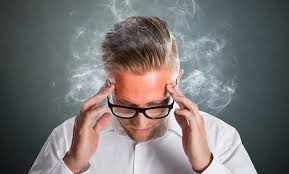
MENTAL LEVEL
At 1) mental level stress (where the imbalance usually starts before reaching the other levels), manifests itself as constant thoughts of worry, doubt, indecision, fear, sadness, anger, for example, directed to the external world – usually associated to negative experiences, unresolved situations or conflicts with other people or external agents. It is important to emphasize that these situations are, for the most part, real and concrete, not necessarily imaginary or overestimated, in principle.
The consequences of mental stress are quite uncomfortable, as concerns occupy brain space (which could be used for creative or initiative-taking activities) and the results can be quite negative for each person (for example: difficulties in analyzing real everyday situations ; delay or stoppage in decision making; breach of trust in interpersonal relationships; difficulties in identifying and solving problems, etc.). In severe cases, they can generate voluntary social distancing (regardless of the mandatory covid-19 pandemic) and paranoid mental content (with connotations of frequent or constant persecution, not entirely based on objective reality) or fatalistic (where “destiny” “steals ” the individual’s responsibility for his/her own life).
When these negative thoughts are directed to the inner world (to the person themselves), they can generate gradual behaviors of introspection, discouragement or disinterest (associated with real or unmotivated events) and derogatory self-concepts, such as low self-esteem, insecurity, passivity, which may culminate in self-sabotage and victimization narratives (validation of their own “disabilities,” losses and failures).
When even more serious, they can trigger the person’s abrupt disconnection from the outside world, discrediting their own inner potential, leaving aside opportunities to improve their skills or learn new things and avoiding contact with people and situations that may “seem to confirm ” their own perceptions of inadequacy or inferiority.

EMOTIONAL LEVEL
At 2) emotional level stress manifests itself much more noticeably than in the mental world, as emotional reactions are more visible and overwhelming, as well as more resistant to mind control. It is usually triggered by mental stress and tends to increase in intensity if its sources of imbalance are not addressed.
Unlike the mental, rational/logical and more “controllable” level, emotional stress materializes self-deprecating (or externally resentful) thoughts in the form of behavioral changes, mood swings and lack of control in/or muscle/energy tone, from the less painful ones, such as grief, sadness, impatience, irritability and anxiety, on the extreme end, even pathological ones, such as morbidity, hatred, craving for revenge or depression.
The results of emotional stress are potentially more harmful than mental ones, both for the person and for those who live or work with them: emotional instability, difficulty in attention and concentration, greater potential risk of incurring mistakes and accidents, excess vulnerability and sensitivity to the reduction of logic and resilience and, in more severe cases, aggressiveness (verbal and physical), burnout or neurasthenia (nervous breakdown), panic syndrome and self-punishments of varying degrees (self-mutilation and risk of suicide, for example) – just to mention some of the most well-known themes (and most publicized in the media, in general).
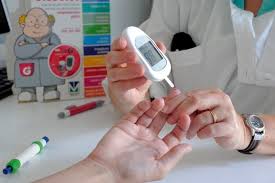
PHYSICAL LEVEL
At level 3) – the best known (and cited) definition of stress at the physical level is that it represents a response of the body to situations of pressure and threat and helps to deal with events of imminent danger, with the release of adrenaline and cortisol in the nervous system.
This level of stress quite possibly generated or matured at the mental level and potentiated (extended) in the emotional world (except in unforeseen situations, impromptu), materializes in the patients’ own bodies, diseases or anomalies that mirror or reflect those negative emotions and thoughts of concrete, visible and often permanent form.
Acquired attention disorder, allergies, migraine, anorexia, bulimia, impotence, infertility, autoimmune diseases (rheumatoid arthritis, multiple sclerosis, lupus, psoriasis, vitiligo, etc.) tend to be some of the ways in which the emotional content experienced in situations of stress (breakup, loss, abandonment, rejection, shame to ridicule for bullying, etc.) or in traumatic events (accidents, physical violence, injustices, betrayals, persecution), which increased the emergence of these psych somatizations.
How to manage (and minimize, control or eradicate) these stressful situations?
This is a question that demands answers at various levels of depth and focused on a common goal: restoring the mental, emotional and physical health of patients affected by stress.
As the sources and levels of intensity are very diverse and varied, including personal histories, psychological profiles, attitudes and highly heterogeneous behavior patterns (Type A x Type B, for example), depending also on the socioeconomic and cultural contexts and even of genetic patterns of greater or lesser susceptibility and propensity to stress, it should be noted that, in a way, online life and globalized businesses, combined with excessive functional readiness, the demand for constant updating and self-development and the 24/7 bombardment of media stimuli, makes all of us, in a way, practically fully exposed to and affected by stressful factors that are already relatively “normalized”, to the point of not realizing that they have already been incorporated in our routine.
In a humorous way (which might seem comical, if it weren’t often tragic), “they are our daily guests for lunch and they accompany us daily, at night, to the bedroom.”
(*) An example of this: “Stress is part of the daily life of a substantial portion of Brazilians. According to an online survey conducted by the Institute of Psychology and Stress Control (IPCS) with 2,195 Brazilians, 34% of respondents said they had an “excessive” level of stress.”
(*) Source: since 02/01/2017 http://g1.globo.com/bemestar/noticia/2017/02/veja-sete-dicas-cientificamente-comprovadas-para-redutor-o-estresse.html
Additionally: 16 Simple Ways to Relieve Stress and Anxiety (via Healthline)
https://www.healthline.com/nutrition/16-ways-relieve-stress-anxiety#9.-Learn-to-say-no
The options for combating and treating stress are as diverse and gradual in depth and specificity as its own causes, ranging from the adoption of regular physical activity, the practice of healthy eating and sabbatical retreats to drug solutions associated with psychotherapeutic / psychiatric treatments and ad hoc hospitalizations for a total-reset (review of self-vision, values, self-limiting beliefs, life purpose and expectations of self-fulfillment and legacy of their own personal history, on their own and for their businesses and associations, in particular – and to the world in general).

3 GENERAL TIPS ON HOW TO MANAGE STRESS
Search for the causes
Periodic check-up and observe the indicators of change in stability and variations in the historical pattern of these indices, during assessments with experts. It is important to be open to receiving feedback and actively listening to the findings and recommendations of experts in the different techniques for identifying and evaluating stressful conditions in their three main categories (mental, emotional and physical) and in their multivariate manifestations.
What appears to us as the main cause of a stress symptom is not always really its root cause, often requiring a clinical and therapeutic deepening of the initial anamnesis (more exams, more one-on-one sessions between specialist and patient and gradual construction of a satisfactory level of solid mutual trust, based on the sharing and exploration of possible stress-generating factors during the consultations).
Deal with experts
Ideally, try opting for traditional and evolutionary scientific knowledge, choosing professionals whose service history and technical achievements and specialties have not been subject to ideological questioning or presented debatable results in terms of effectiveness and consistency, throughout their time in the profession.
Even when you prefer to resort to alternative or non-allopathic therapies, such as homeopathic, herbal or naturopathic and similar, it is vital to verify the correct sanitary approval and legal regulation of the exercised/offered practices and the functional history of the providers of these services.
Considering the breadth of treatment options offered in relation to stress, it is necessary to familiarize in advance with the philosophies and nature of the practices underlying all these services before making a conscious choice for any of them, which requires a personal investment of time and attention in research, reading, questioning and pre-consultations for second opinions that will bring greater wealth of data, information and useful considerations to make better choices.
Despite the extreme superficiality of many content and discussions available in quantity on the Internet and social media, many people take risks (and expose their kin to them) by using them as “absolute truths” or as a prescription for self-medication or dissemination of “miraculous solutions” which, without any derogatory connotation of faith or religiosity, do not replace or dispense with science, as we have already learned historically with the vaccine eradication of smallpox and polio, for example.
Just as an example, “naturopathy uses a combination of treatments such as acupuncture, counseling, exercise therapy, plants, hydrotherapy, nutrition, physiotherapy (e.g., heat or cold treatment, ultrasound and/or massage), guided imagery and stress treatment. Naturopathic medicine is part of the integrative practices of the SUS (Unified Health System) and is holistic, that is, it seeks the cause of the disease through the understanding of the body, mind and spirit. A number of therapies and techniques are involved, such as nutrition, herbal medicine, homeopathy and acupuncture.”
Even though many of these practices are validated by experts and regulatory or scientific bodies (such as SUS and Fiocruz), the more flexibility and variety of offers and easier access to practices that are exempt or independent of the usual scientific rigor applied to drugs that require a nominal prescription, the greater the risk of non-compliance with basic health rules and imprecision in inspection procedures and in the evaluation of effectiveness of these interventions.
Especially important: Do not hide data or information relevant to your stress context from the experts and professionals involved. All information elements, even if they seem irrelevant or secondary, can, as soon as they are shared, ensure greater speed and accuracy of the diagnosis and the consequent recommended treatment.
Practice mindfulness (attention or present consciousness)
“Translated into Portuguese as “Full Attention” or “Full Awareness,” mindfulness has become popular in large companies among employees who seek relief from everyday stress, in addition to helping to improve their mental abilities and, consequently, productivity at work.”
“According to the Brazilian Academy of Mindfulness, among the various improvements in the quality of life of the person who practices this meditation, the growth of creativity, memory and speed in getting answers stand out.”
As an alternative and even in synch with or abiding meditation, “Yoga improves concentration, reduces stress and helps you lose weight.”
Try to remain observant and attentive to changes in mood, tolerance and lack of control in situations of some level of importance or seriousness, but which are not extreme, unacceptable or exceptional. In the vast majority of situations that involve aspects related to health maintenance and preservation, prevention and discipline in self-observation are essential to avoid triggering (and worsening) preventable clinical cases.
Last but not least: try not fitting into limiting or “fatalistic” stories or narratives; not getting used to stress or treating it as something “normal” or as an integral and “acceptable” part of life, work, or the seasonal variations of the ecosocial panorama in which one is inserted.
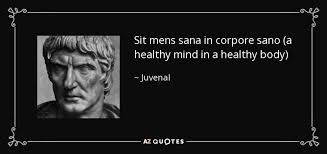
We end today’s theme remembering that the concept of health can be summarized by the expression “MENS SANA IN CORPORE SANO“, but currently expanded to the point of understanding the human being as a plural, gregarious, social, holistic entity, eager for the “new” and in a constant process of learning and evolution. This Latin proverb is intended to draw attention to the symbiosis and complementarity that exists (or should exist) between body and mind.
HEALTH!
Luiz Botelho.-
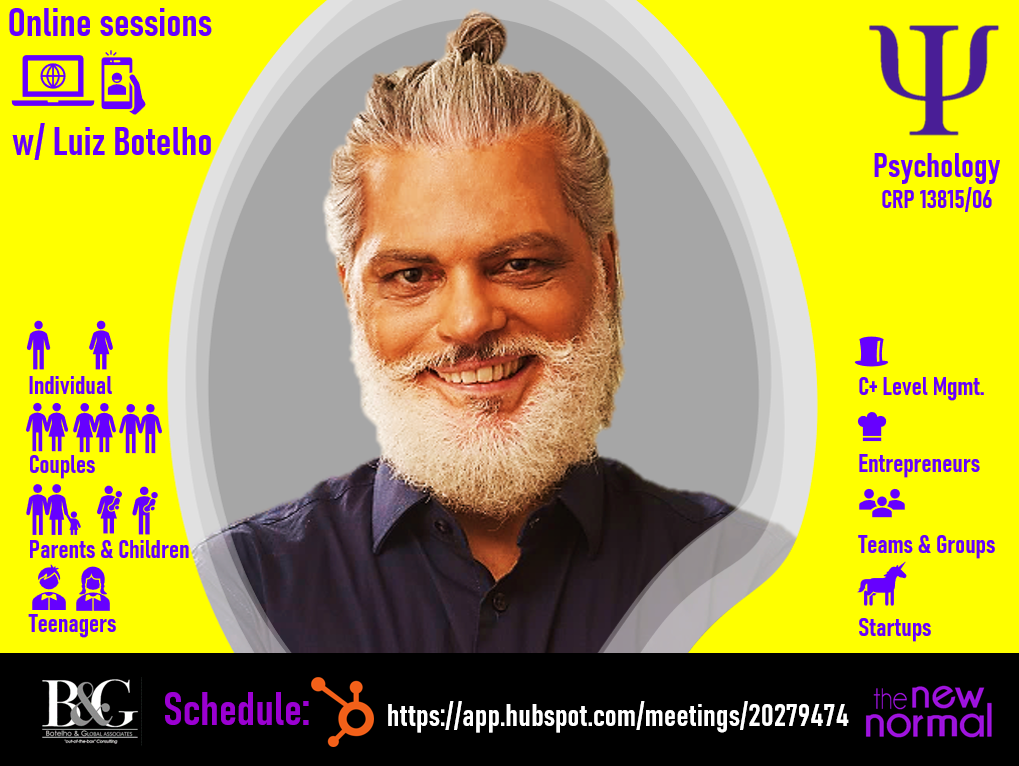
“The mind that opens to a new idea will never go back to its original size.” ALBERT EINSTEIN.
——————————-
No mês de Maio, fizemos uma pesquisa online com nossos clientes e parceiros, perguntando: Quais destes #temas preferem para os #podcasts de Maio-Junho 2021?
——————————-
In May, we conducted an online survey with our customers and partners, asking: Which of these #themes do you prefer for the May-June 2021 #podcasts?
——————————-
En mayo, realizamos una encuesta en línea con nuestros clientes y socios, preguntando: ¿Cuál de estos #temas prefieres para los #podcasts de mayo a junio de 2021?
——————————-
What #themes should we select for the May-June, 2021 #Podcasts?
via @LinkedIn via @Twitter via @Facebook
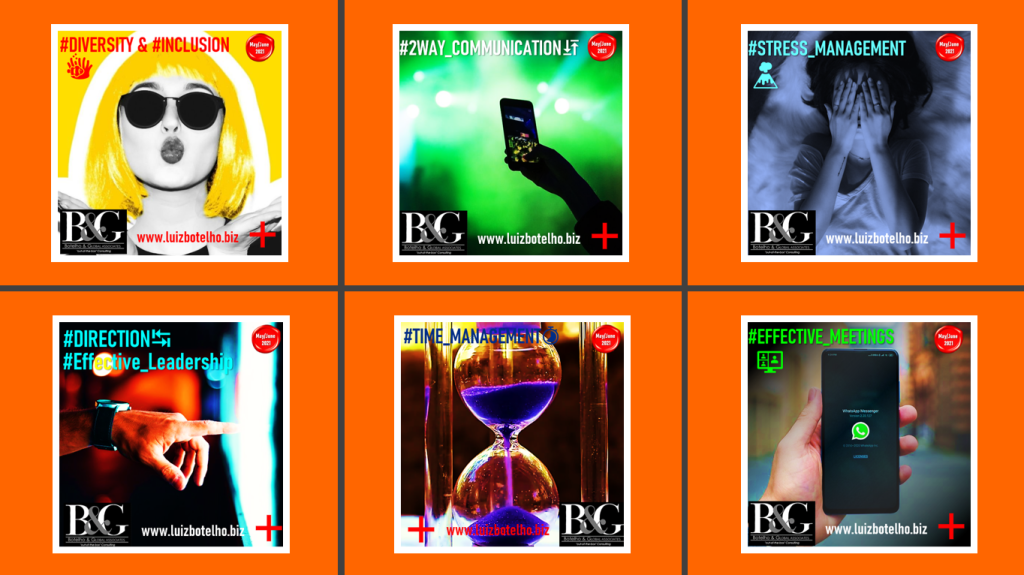
1) Diversidade e Inclusão / Diversity & Inclusion / Diversidad e inclusión
2) Comunicação de Ida-e-Volta / 2-Way Communication / Comunicación de ida y vuelta
3) Gestão de Stress / Stress Management / Manejo del Estrés
4) Liderança Eficaz / Effective Leadership / Liderazgo Efectivo
5) Gestão de Tempo / Time Management / Gestión del tiempo
6) Reuniões Eficazes / Effective Meetings / Reuniones Efectivas
——————————-
Most Voted:
1) STRESS MANAGEMENT
2) EFFECTIVE MEETINGS
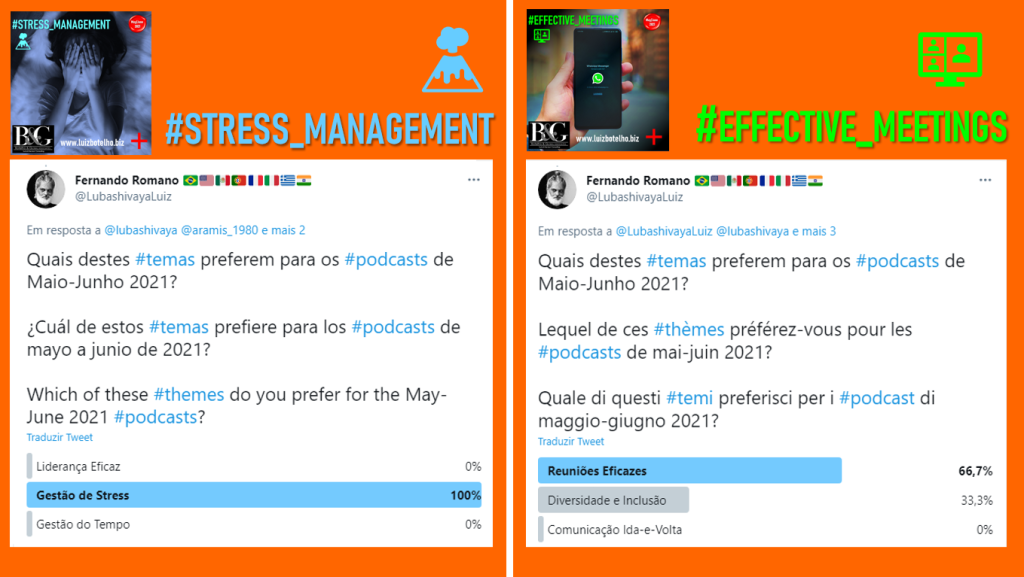
——————————-
Neste #vídeo, apresentamos os #resultados.
In this #video, we present the #results.
En este #video, presentamos los #resultados.
Recomended reading:
“Soft Skills and Transferable Skills – What are they and 10 Tips on How to Develop them” | Ennie Chipembere Chikwema | April 23, 2019 | https://bit.ly/2TsccyT
“Hard Skills vs. Soft Skills: What’s the Difference?” | Alyson Doyle | January 20, 2020 | https://bit.ly/3fMoWta
——————————-
By noting the imbalance of the father figure in many vulnerable socioeconomic situations in Brazil, especially during the covid-19 pandemic period, we were encouraged to create the “FATHER & SON Reconnection and Healing Program”, in 2020.
——————————-
Musical recommendation: #RelaxingMusic #SleepMusic #PianoMusic
12 Hours of Relaxing Music – Piano Music for Stress Relief, Sleep Music, Meditation Music (Riley)

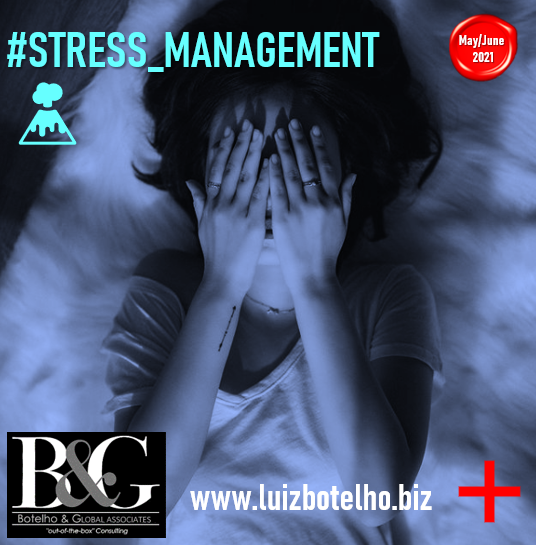
Soft Skills Series | Stress Management | Artigo Original, postado em Português, via LinkedIn:
https://www.linkedin.com/pulse/soft-skills-series-stress-management-luiz-botelho/
LikeLiked by 1 person